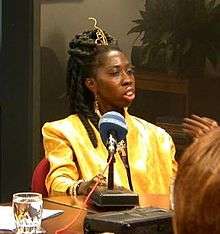Marquetta Goodwine

Marquetta L. Goodwine, who was elected Queen Quet, Chieftess of the Gullah/Geechee Nation,[1] is a native of St. Helena Island, South Carolina. She is an author, preservationist, and performance artist. The Gullah/Geechee corridor begins in North Carolina and extends southward to Jacksonville, Florida, encompassing the Sea Islands and the Lowcountry.
Goodwine is the founder of the Gullah/Geechee Sea Island Coalition. In 1999 she became the first Gullah to speak before the United Nations, giving testimony at an April 1 hearing of the Commission on Human Rights in Switzerland. She has since been invited to participate in the United Nations Forum on Minority Rights which was first established in 2008.
Goodwine is also the Chair of the Gullah/Geechee Cultural Heritage Corridor General Management Plan and Expert Commissioner for South Carolina. She is a member of the 15 person commission established by the United States Gullah/Geechee Cultural Heritage Act which was passed by the United States Congress.
Goodwine served as a consultant for the 2000 Mel Gibson film The Patriot, which featured scenes set on the South Carolina coast of the Gullah/Geechee Nation. She has been an advisor to several historic documentaries, including This Far by Faith: The African American Religious Experience, The Rise and Fall of Jim Crow, Slavery and the Making of America, Reconstruction: The Second Civil War, and The Will to Survive: The Story of the Gullah/Geechee Nation. She also lectures throughout the world.
She is the founder of a historic presentation troupe "De Gullah Cunneckshun", which has recorded several CDs and been featured on films and film soundtracks.
Books
- Goodwine, Marquetta L. (1995). "St. Helena's Serenity." Gullah/Geechee: The Survival of Africa's Seed in the Winds of the Diaspora series v. 1. Brooklyn, NY: Kinship Publications.
- Goodwine, Marquetta L. (1997). Gawd dun smile pun we: Beaufort Isles. Gullah/Geechee the Survival of Africa's Seed in the Winds of the Diaspora series, v. 2. Brooklyn, New York: Kinship Publications.
- Goodwine, Marquetta L. (1999). Frum wi soul tuh de soil: The Cash Crops of the Sea Islands. Gullah/Geechee Africa's Seed in the Winds of the Diaspora series, v. 3. Brooklyn, New York: Kinship Publications.
- Goodwine, Marquetta L., and & the Clarity Press Gullah Project, eds (1998). The Legacy of Ibo Landing: Gullah Roots of African American Culture. Atlanta, Georgia: Clarity Press.
- Goodwine, Marquetta L., and Ronald Goodwine (1994). Brother and Sister... Heart to Heart (1994). Brooklyn, New York: Extended Kinship Appeal, Inc.
- Goodwine, Marquetta L. (2005). "365-66." Gullah/Geechee: The Survival of Africa's Seed in the Winds of the Diaspora series v. 4. St. Helena Island, SC: Kinship Publications.
- Goodwine, Marquetta L. (2006). "Chas'tun an e Islandts." Gullah/Geechee: The Survival of Africa's Seed in the Winds of the Diaspora series v. 1. Brooklyn, NY: Kinship Publications.
- Goodwine, Ronald "Kuumba", and Marquetta L. "Queen Quet" Goodwine (2004). T'inkin' 'bout Famlee: A Geechee Down Novella. St. Helena, South Carolina: Kinship Publications.
- Goodwine, Marquetta L. (2013). "Love's Sea Island Song" St. Helena Island, SC: Kinship Publications.
References
- ↑ Finney, Carolyn (2014). Black Faces, White Spaces: Reimagining the Relationship of African Americans to the Great Outdoors. University of North Carolina Press. p. 101. ISBN 9781469614496. Retrieved 21 September 2015.
External links
- "Gullah/Geechee Nation.
- "Disya Who WEBE!", Gullah/Geechee Nation.
- Gullah Geechee Angel Network.
- "Marquetta Goodwine: Queen of the Gullah Geechee Nation, from The African Soul site.
- "Queen Quet, Head-of-State for the Gullah/Geechee Nation.
- Queen Quet Marquetta Goodwine.
- Gullah/Geechee Sea Island Coalition
|